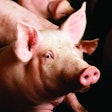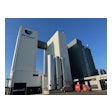
Global forces such as COVID-19 will affect how the global feed and food industries evolve, but what strategies can your business implement to survive and thrive?
Eventually, every industry comes to a “strategic inflection point” or a turning point after which “all bets are off,” and today’s concurrence of geopolitical and economic uncertainty will usher in a new era for the agrifood supply chain.
The forces that drive an industry to change are rarely a surprise; it is the speed with which they catch up to an industry that catches it off guard, said Dr. Damien McLoughlin, Ph.D., marketing professor at the University College Dublin (UCD) Michael Smurfit Graduate Business School, during his presentation at the Alltech ONE Virtual Experience.
McLoughlin identified six major players or forces — their influence and the movements they represent — as pivotal to shaping global agrifood production far into the future: U.S. President Donald Trump, Russian President Vladimir Putin, Chinese Premier Xi Jinping, climate change activist Greta Thunberg, Impossible Foods founder and CEO Pat Brown, and, of course, COVID-19.
In his opinion, COVID-19 has accelerated change in a way no one ever thought possible, bringing us to the inflection point.
“After an industry change, there are two paths: the path to catastrophic decline or exponential growth,” McLoughlin said, suggesting businesses have a choice, but they must be honest about which path they are on. “Are you ignoring the signals which are already at play pre-COVID-19 or with COVID-19?”
COVID-19 the great accelerator
While many consider the COVID-19 pandemic a black swan disruptor, McLoughlin argued that the framework for the long-term changes that will be attributed to it were already in motion.
“COVID-19 is like gasoline on the fire,” McLoughlin said. “The fire is cooking away nicely in the background. You drop some gasoline on suddenly, whoosh, the whole thing takes off!”
The COVID-19 crisis is “leading to a fundamental re-evaluation of business models” with two obvious trends emerging:
- Commitment to a digital way of doing business
The utilization of digital platforms across all sectors will force employers — and employees — to re-evaluate the traditional ways of conducting business.
“If we can all work online, what else can we actually do? How much can we save? How much more efficiency can we achieve? How much innovation can we introduce into the system?” he asked.
- Acceleration of existing trends
“Crises like COVID-19 do not introduce new trends into the industry,” he said. “What they do is they accelerate existing trends.”
During the COVID-19 crisis, the global food supply chain has struggled to deliver food from the farm to supermarkets. But McLoughlin argued that climate change, for example, will present society and the agrifood system with a challenge exponentially greater than COVID-19.
The virus exposed the fragility of the global food supply chain to the consumer, he said, and that changes will be required and demanded from the global food supply in the future.
Feed manufacturers at a crossroad
Consolidation and integration have become an evergreen trend in animal agriculture, but McLoughlin predicts a rapid, global concentration of the animal protein feed sector.
“When you have consolidation [in animal production], those big players will not buy from small- and medium-sized feed mills; they buy from large feed mills,” he said. “The farmers take instructions from category leaders. They will buy their feed and their feed ingredients from the big guys. They are mixing the feed and the ingredients in a mixer wagon on their own farm, and they are taking advice online.”
The competencies required to survive in this model are very different, and small- and medium-sized feed mills may not have them, he said.
Despite his bleak outlook, McLoughlin suggested there are opportunities for all feed mills to avoid catastrophic decline but, to do so, they must “cooperate and to collaborate with other members of the supply chain” and they need a “wartime” mentality to succeed.
Becoming a ‘wartime CEO’
Based on Columbia Business School Professor Rita McGrath’s book “Seeing around corners,” McLoughlin stressed the need to think through strategy scenarios to avoid incremental thinking. Leaders can do this by creating and addressing strategic scenarios before they become a reality. The practice forges “wartime CEOs” who can take the emotion out of a situation, remain calm, focus on the tasks that must be completed and emphasize shared risk with their entire team.
“They’re able to do this because they have prepared for war over and over and over again, so when it happens, it’s not a surprise,” he said.
During crises, leaders do not have the normal time and space to act, so to succeed, they will require an “empathetic organization,” which means every person in the organization understands that they are part of the team and part of the solution.
McLoughlin also advises leaders to build innovation proficiency.
“You have to learn how to do it, but you can’t learn how to do it when you have to do it,” he said. “You have to develop proficiency over time. Innovation is not a switch you can turn on and turn off. You have to always do it; you have to commit yourself to do it.”
To enhance the resilience of an organization, he suggests management discuss strategic scenarios with their employees — identifying what the future may look like based the experiences of other organizations or trends happening outside the business — and ask:
- How can we protect ourselves not to be taken by surprise?
- What are the opportunities that exist in our environment?
- What capabilities and resources do I have now — or can I assemble quickly — that will allow me to take advantage of these opportunities?”
“We’re in a time of enormous challenge, but challenge always presents opportunities,” he said.
Editor’s note: The Alltech Ideas Conference (ONE) is an annual event held in Lexington, Kentucky. Due to the COVID-19 pandemic, the company adapted and launched the Alltech ONE Virtual Experience, which broadcasts May 18-22, 2020. The new virtual event has drawn more than 21,500 registrants from 126 countries.













